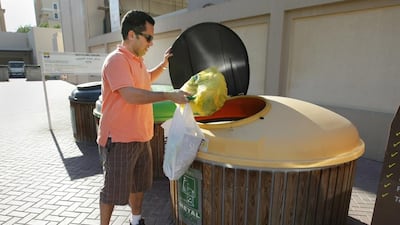DUBAI // Thirteen recycling centres will be set up at customer service centres, municipality parks and community areas that draw crowds.
After the first centre launches this month, one will be opened every week thereafter.
“We want to make recycling a habit and to give people a clean, proper area to dispose of their waste,” said Abdul Majeed Saifaie, director of Dubai Municipality’s waste management department.
“Whatever recyclable material you can think of, we have thought about it and it will be found at the centres. This will cover everything dry, clean and recyclable – except food.”
The large sorting areas will cover batteries, bulbs, mobile phones, televisions, clothes, electronic items, plastic and glass bottles. Some of the locations will include parks in Karama, Safa park and Al Barsha.
Dubai Municipality in the past has often received emails from residents asking where they could take material they had segregated at home. Some residential areas have sorting bins but these are not widespread. The move was welcomed by the community.
“It sends a message to children and families so they will separate paper, cans, mobiles, plastic bottles from the general waste,” said Sini Haridasan, environment co-ordinator at Our Own High School, Al Warqaa.
The school has won environment awards for the past three years for paper, mobile and can-collection drives.
Malls, large department stores and grocery chains are being encouraged by the municipality to set up recycling centres at their own cost.
rtalwar@thenational.ae


